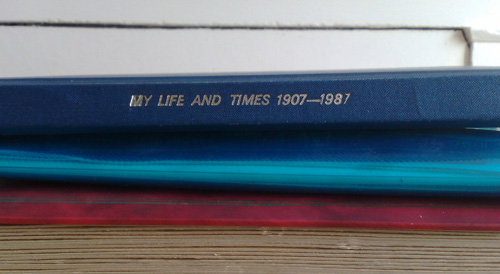
It’s Remembrance Day today, 90 years since the end of the First World War, 63 since the Second, and all the others too, and it’s always been resonant in my family. On my mother’s side, there were lots of boys in the family: uncles, brothers and sons, who didn’t come back, and on my father’s side a smaller family but no less a part played.
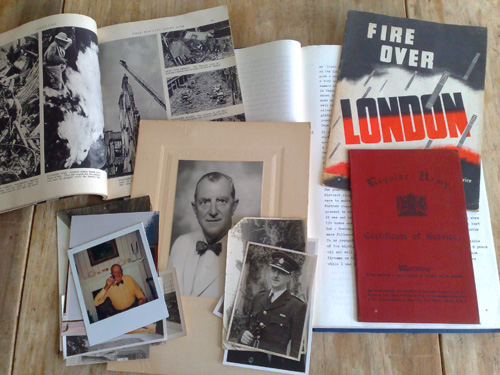
Last year, my father gave me my Grandpa’s archive, comprising his photograph collection, some ephemera, and his memoirs, which he dictated to my Grandma, who dutifully typed them up, in the late 1980s. He had a pretty interesting life, running away from home in the East End of London aged 17 and lying about his age to join the Royal Engineers in 1924, seeing service in Egypt and the Sudan before returning home to join the Fire Service, which had always been his primary interest. He was the youngest Fire Force Commander in the Second World War, based in the West Midlands, and during and after the war he was repeatedly at the head of reform in the Fire Service, putting in place organisational practices still in use today. Among many other events, his memoirs contain a vivid recollection of the firebombing of Coventry in November 1940. Here’s his obituary in the Independent (which contains only a couple of glaring errors).
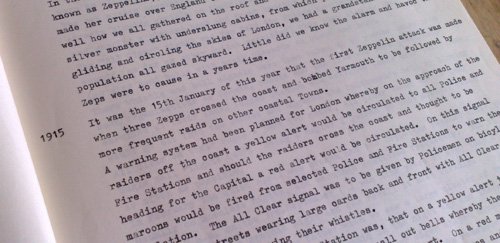
I’ve been trying to think what to do with this material, because I think something should be done. My Grandpa was no prose stylist, and it’s unlikely that his memoirs will be of interest, except in small doses, to anyone without a professional interest in the history of the period, the prewar Army or of the postwar Fire Service – and blogs like this. But it definitely has value to them, so I think I need to get some copies made and make sure they’re placed in the right archives. And while I’m doing that, I might as well get them digitised, made searchable and so on.
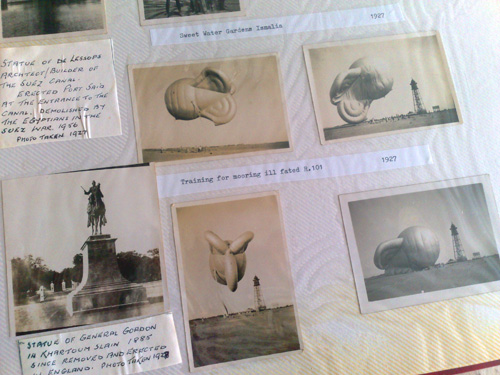
The photographs are quite wonderful, so I think scanning and Flickr’ing is in order for them. They haven’t been particularly well-looked after, and they’re degrading fast. There are so many stories, and so many people in here, and I’m such a geek about this stuff, it seems wrong to keep them locked up in these albums.
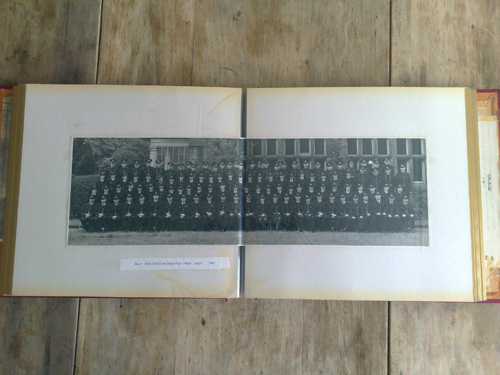
So, I’m looking for suggestions of what to do with this material, beyond what I’ve suggested. Are there accepted formats and channels for this sort of thing? Are there good precedents of how to do it that you can think of? And how should I go about getting the typeset digitised? I have some ideas, but I’d like to hear yours.
In response to a query already recieved, the typescript is 150pp, 45-line typeset, approx 90,000 words, I’m guessing…
Comment by James Bridle — November 11, 2008 @ 3:04 pm
Nice collection, have you tried Blurb Books or something similar.
Also Billy Abbott / Cowfish discovered a great interactive book thingie – Manolis – which might be interesting for something like this. Here’s avideo of it in action
http://blog.gardeviance.org/2008/10/looking-for-good-author.html
Comment by Annie Mole — November 11, 2008 @ 5:52 pm
Thanks Annie. I know Blurb and something like that (e.g. Lulu) will definitely be useful at some point. Need to figure out the best way of digitising it all first though.
I covered Manolis’ Bluebook back here, and while I hadn’t thought of turning this into an interactive project, it’s a lovely idea. Hmmm….
Comment by James Bridle — November 11, 2008 @ 5:57 pm
One thing I’d mention is that small archives (local history, or specific-event or -organisation archives, etc.) are generally thought of as good places for this sort of material. However, they are generally (universally?) under-resourced, and end up doing very little, beyond initial accession, with donated material. Basically, it’s either do it yourself, or pay someone.
But what I wanted to comment on was just: Go for it! Digitise the whole collection, get it online! Even scanning and dumping up to the Internet Archive would be great, even with mediocre metadata. The original artifacts are of inestimable value, yes, but without access to them, what’s the point?!
I will be interested to hear what you decide to do; this is a very common situation for family historians all over the place, and I don’t think anyone’s really come up with a particularly great solution yet (to what to do with archive material that is of limited interest).
(Have you considered Wikisource for the memoir?)
Comment by Sam — November 12, 2008 @ 8:56 am
I think this would be a great interactive project too! The pictures and the stories need to go hand in hand, and if you could drop any audio commentary on family trivia it would really be interesting. I did an interactive postcard project that tied short stories, period images and music together and I thought the effect was much more powerful than its parts.
Also, there’s an good project Second Story Interactive did
http://www.digitalvaults.org/
that does a beautiful job with individual stories and their accompanying images (albeit on a tremendous scale).
Be sure to let us know if you do it…
Comment by Travis — November 14, 2008 @ 10:01 pm
It sounds like a fascinating archive and I’d agree that larger specialist museums might be the way to go – especially for the photographs where they’ll have (or have access to) expert conservators. How about the Imperial War Museum (http://collections.iwm.org.uk/server/show/nav.2142)? Or maybe even Mass Observation (now University of Sussex), though they seem a bit cash-strapped and there’s no mention of digitisation: http://www.massobs.org.uk/donating_personal_papers.htm.
Comment by Martin — December 3, 2008 @ 5:05 pm